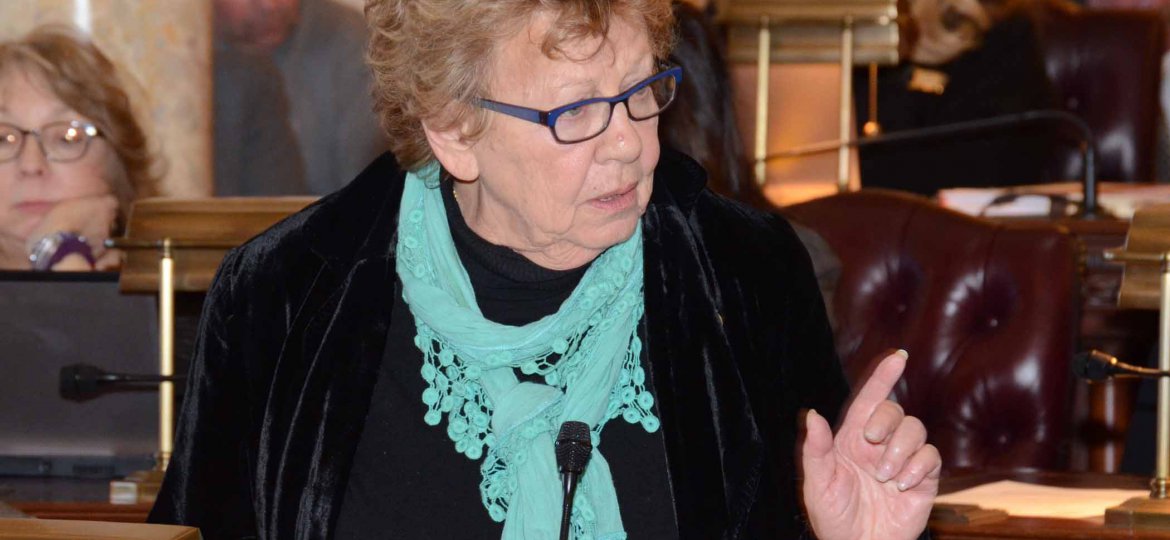
Developed After Extensive Hearings By Legislative Oversight Committees, Bipartisan Bills Would Reform Critical Transportation Agencies
TRENTON – Legislation sponsored by Senate Majority Leader Loretta Weinberg (D-Bergen) requiring major reforms to improve the transparency, ethics, responsiveness and performance of the Port Authority of New York and New Jersey and at New Jersey Transit was approved unanimously by the by the Senate today.
“Legislative investigations into problems at the Port Authority following Bridgegate and at NJ Transit following the fatal derailment of a commuter train in Hoboken revealed serious Board and management deficiencies at both agencies that undermine the ability of these critical agencies to deliver the efficient mass transit services that is the lifeblood of our region’s economy,” said Senator Weinberg (D-Bergen).
“The reforms we are putting in place are designed to guarantee that the Port Authority never goes back to the era of secret toll hikes and stonewalling that characterized the agency leading up to and including Bridgegate,” Senator Weinberg said. “And we need equally sweeping reforms at NJ Transit to ensure that it returns to its status as one of the nation’s preeminent mass transit agencies after years of increasing breakdowns, patronage appointments, a pattern of sexual and racial discrimination lawsuits, and delays in the installation of life-saving Positive Train Control technology.”
Senator Weinberg noted that she developed the reform legislation with former Senate Legislative Oversight Committee Chair Bob Gordon, and that the bills have broad bipartisan support, with Senate Minority Leader Tom Kean Jr. (R-Union) as the leading GOP cosponsor. The NJ Transit bill grew out of 15 months of joint hearings with the Assembly Judiciary Committee.
The Port Authority bill, S-619, represents the third effort in five years to bring together New Jersey and New York to reform the Port Authority. The bill was amended today to include the future appointment of an independent Chief Executive Officer with the chairmanship of the Port Authority Board to rotate among the two states, replacing the current system under which the New York governor appoints the Executive Director and a New Jersey Port Authority Board member serves as Chair.
“The Port Authority made tremendous progress under the leadership of previous Chair John Degnan. Current Chair Kevin O’Toole and Executive Director Rick Cotton are working collaboratively to keep the Port Authority focused on its core transportation mission,” Senator Weinberg said. “With the Gateway Rail Tunnel project in limbo because of President Trump’s opposition, we want to keep their leadership while we implement the critical expansion of the Port Authority Bus Terminal and the PATH system.
“When the current Executive Director steps down, the new CEO search would get underway. New Jersey would retain the chairmanship to provide continuity for the first year after the new CEO starts on the job. After that first year, the Chair’s position would go to a New Yok board member and then rotate every two years between the two states,” she said.
The Port Authority bill was also amended to authorize the governors of the two states to appoint full-time Policy Liaisons to participate fully in all deliberations and discussions on setting policy priorities and on the development of the capital plan, to monitor the progress of all ongoing projects and to participate in all decision-making regarding the transfer or sale of Port Authority assets.
“Putting Policy Liaisons in place from each state will ensure ongoing coordination with transportation agencies in both states and provide key policymakers in each state with the ability to be involved in setting priorities during the planning process, rather than after recommendations go to the Board. This eliminates the management conflicts created by appointing a Deputy Executive Director with separate personnel authority that was at the heart of the Bridgegate lane closures,” Senator Weinberg said.
“We will work closely with our New York legislative counterparts to ensure that our reform legislation meets the needs of both states, and the rail, bus and auto commuters, air passengers and shippers who rely on the Port Authority’s services,” she said.
The Port Authority reform bill also establishes the right of Legislatures of both states to call Port Authority officials in for legislative hearings, and requires 60 days’ notice and extensive public hearings on the agency’s 10-year Capital Plan and any proposed fare increases.
The NJ Transit reform measure, S630, sets similar strict requirements for public hearings on both any proposed fare increases and on substantial rail and bus schedule changes, including those that affect the start or end of a scheduled service by 30 minutes or more.
The NJ Transit legislation increases the size and diversity of the NJ Transit Board by including two commuter representatives, two members recommended by regional planning organizations, two transportation labor union representatives, and one appointee each recommended by the Senate President and Assembly Speaker.
It also provides commuters with greater opportunity to have input by requiring half of all NJ Transit Board meetings to be held in the evening, and by formalizing new geographically based NJ Transit Board advisory committees, which the Board would be required to consult before adopting any proposed fare increase or significant curtailment or expansion of service.
Both the Port Authority bill and the NJ Transit legislation passed by a 37-0 vote and now go to the Assembly for approval.

